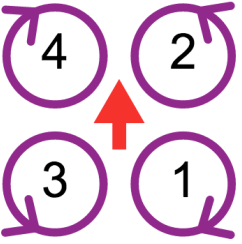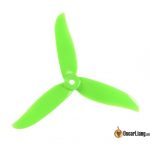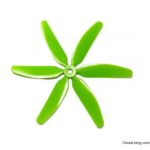Propellers are the important element of any FPV drone as they decide the ability, smoothness and responsiveness of the plane. These specialised airfoils connect to the motor hub and are available quite a lot of shapes, sizes, and blade counts. Understanding the fundamentals of propellers is essential for optimizing the efficiency of your quadcopter.
Suggestions
Propellers are designed for various functions, the pitch, form and materials all play a component in efficiency and flight traits. Right here I’ll share what I believe are the very best propellers that it’s best to get.
I’ve tried all main propeller manufacturers and located HQ props to be one of many smoothest and best to tune. They appear to be extra balanced and trigger much less vibration than others. I’ve additionally had higher luck with triblades than twinblades in relation to attaining smoothness.
Finest 5″ Props
HQ 5×4.3×3 V2S
Finest All-Rounder
The “smoothness” of the prop performs an enormous half in how effectively the drone flies, and the way a lot we are able to push PID and filters in tuning. Propellers that produce much less vibration will inherently have a bonus in that regard. The burden distribution of the blade and total weight of the entire prop additionally issues, the simpler it’s to spin up and decelerate, the sooner it’s to vary RPM, which interprets into sooner response of the drone and higher “propwash” dealing with.
I really like the HQ 5×4.3×3 for its linear throttle response, which provides me very exact management by way of the entire throttle vary. The responsiveness and grip are simply superior, the quad feels snappy and linked to the sticks.
Get the HQ 5×4.3×3 from:
AliExpress: https://s.click on.aliexpress.com/e/_DneZBnf
Amazon: https://amzn.to/3dlBRDF
RDQ: https://oscarliang.com/product-9yhl
Banggood: https://oscarliang.com/product-5lqa
GetFPV: https://oscarliang.com/product-v2u8
Finest 5″ Props for Sub250
Gemfan LR5126 2-Blade
Versatile Choice with Respectable Efficiency
Designed for sub250 5″ lengthy vary, effectively matched to 2004 motors. Helps each T-mount and commonplace 5mm prop nuts.
Product Web page:
AliExpress: https://s.click on.aliexpress.com/e/_DDlqcI1
GetFPV: https://oscarliang.com/product-oe2l
RDQ: https://oscarliang.com/product-58rm
NBD: https://oscarliang.com/product-mnv6
[/lgc_column]
Finest 7″ Props
Finest 3″ Props for Freestyle
Finest 3″ Props for Cinewhoops
Finest 3.5″ Props for Freestyle
Finest 3.5″ Props for Cinewhoops
What’s A Propeller?
Propellers, also referred to as props, are the unsung heroes of an FPV drone. They play a vital function in producing thrust that lifts the quad off the bottom and permits it to maneuver in several instructions. Nonetheless, many drone pilots typically overlook the significance of choosing the proper propellers, resulting in points equivalent to elevated noise, decreased flight time, and even motor failure.
On this tutorial, we offer a complete information to the various factors that have an effect on the efficiency of FPV drone propellers, together with pitch, form, and the variety of blades. Whether or not you’re a newbie or an skilled pilot, this information will allow you to perceive how to decide on the correct propellers on your quadcopter, enhancing your flying expertise. Study every part it’s essential to learn about propellers and take your FPV drone flying to new heights.
Propeller Instructions
Propellers are designed to spin in both a clockwise (CW) or counter-clockwise (CCW) route. In a quadcopter, two motors spin CW and the opposite two spin CCW, so it’s essential to match the propellers to the motors based mostly on their supposed route of rotation.
On an FPV drone, the off-center placement of the propellers produces each thrust and rotation across the heart of the drone. To counteract this rotation, it’s needed to make use of two CW and two CCW props.
When buying propellers, they often are available pairs of CW and CCW.
To generate downward thrust for the drone to take off, the propellers ought to spin in a method that permits the forefront to chop by way of the air first, with the air then escaping by way of the trailing edge. You’ll be able to simply decide the route of a prop by figuring out its vanguard, which is usually labelled as both CW or CCW on the blade.”
The best way to Mount Propellers?
By default, Betaflight expects the motors to spin as proven within the diagram under. Which means it’s best to set up the CW prop on the motors on the high left and backside proper.
Professional tip: To make it simpler to recollect, simply word that each one entrance props spin into the FPV digital camera, whereas the rear props spin into the rear of the quadcopter.
There are three varieties of propeller mounting in FPV drone motors: M5 threaded shaft, T-mount, and press match.
M5 threaded shaft (5mm) is the commonest in 5″ FPV drones (and bigger rigs). The propeller is connected to a shaft with an M5 thread on the finish and screwed tight with a self-locking nut (also referred to as a “nylon nut”). There are sometimes spikes on the motor bell, which dig into the propeller and maintain it in place.
Within the T-Mount, the propeller is connected to a 1mm or 1.5mm thick motor shaft, secured by two M2 screws onto the highest of the motor bell. This mounting is in style in much less highly effective 2″, 3″, and 4″ FPV drones.
Press-fit (or friction match) is in style in small FPV drones equivalent to tiny whoops and toothpicks as a result of this mounting is extraordinarily mild weight. These drones are comparatively low-powered, so the props are unlikely to fly off even in crashes.
Propeller Dimension
Propeller dimension is given in imperial inches (1″ = 2.54 cm).
When describing propellers, there are two varieties of codecs:
L – size, P – pitch, B – variety of blades:
For instance, 6×4.5×2 (also referred to as 6045×2) propellers are 6 inches lengthy 2-blade propeller and have a pitch of 4.5 inches. One other instance is 5x4x3 (also referred to as 5040×3), a 3-blade 5″ propeller with a pitch of 4 inches.
You may typically see “BN” on the finish of the numbers, which implies “Bullnose.”
You may also see “R” or “C” after the dimensions numbers, equivalent to 5x3R. “R” signifies the rotation of the propeller, which stands for “reversed.” It ought to be mounted on a motor that spins clockwise. “C” is the alternative and ought to be used with motors that spin counter-clockwise, however often, the letter “C” is ignored.
A propeller is claimed to be “heavier” while you improve the diameter, pitch, the variety of blades, or all. It takes extra torque to spin a heavier prop than a lighter prop.
Propeller Size
The size of a propeller refers back to the dimension of the disc that it creates when it spins (or the space from one tip of a two-blade prop to the opposite).
Propellers generate thrust by spinning and transferring air. The sooner the propeller spins, the extra air it might transfer, which generates extra thrust.
Do you know? FPV drones can’t fly in area as a result of there is no such thing as a air for propellers to maneuver.
When the propeller pitch (defined under) and blade rely are the identical, an extended propeller can generate extra thrust as a result of it will increase the floor space. This implies you’ll be able to speed up sooner, nevertheless it additionally requires extra energy from the identical motor. Nonetheless, longer propellers don’t essentially imply sooner flight – pitch is a extra essential issue (as defined under). Shorter propellers can spin up and decelerate sooner on account of decrease drag and momentum, which makes the drone extra agile and responsive.
Propeller Pitch
Propeller Pitch refers back to the distance a propeller travels throughout one revolution, and it’s measured in inches. Basically, it’s how far the propeller would transfer ahead if it have been transferring by way of a strong medium as a substitute of air.
A propeller with the next pitch strikes extra air with every revolution, which might create extra thrust when the plane is touring at excessive speeds. Nonetheless, it additionally implies that the propeller generates much less thrust when the plane just isn’t transferring.
The next pitch propeller may create turbulence and prop wash, which might have an effect on the efficiency of the plane. It additionally spins slower, which might make the plane much less responsive. However, a decrease pitch propeller is extra responsive and might spin up and down sooner, making it higher for manoeuvrability.
Blade Rely
Including blades will increase the floor space and therefore creates extra thrust. That is much like making the propeller longer, besides you’ll be able to match it in a smaller disk space. By rising blade rely improves grip within the air, nevertheless it additionally makes it much less environment friendly and places extra pressure on the motor.
For FPV drone pilots, each two and three-blade propellers are in style for racing and freestyle flying. Most pilots desire three-blade propellers as they’re an important stability between effectivity and energy, they supply extra grip within the air because of the further floor space in comparison with two-blade. However, two-blade is often extra environment friendly as they creates much less drag and draw much less present, therefore nice for lengthy vary flying.
You also needs to take into account the sound these propellers create – when there’re extra blades, it lowers the RPM at a given energy so it’s often quieter nevertheless it additionally is determined by the design.
There are propellers with much more blades, equivalent to quad-blade and hex-blade propellers. Quad-blade propellers are stated to be nice for indoor tracks and cornering, however they’re much less environment friendly than tri-blade and spin at a decrease RPM at a given energy. Hex-blade propellers usually are not really helpful for regular flight on account of its excessive inefficiency, however micro cinewhoops typically use these to enhance their energy because of the lack of area to make use of bigger propellers.
Weight
On the subject of propellers, weight is a crucial issue to contemplate. Basically, lighter propellers are inclined to carry out higher. Heavier propellers have extra mass on every blade and require a extra highly effective motor to spin them. This will result in increased torque loading, making the motor work more durable and probably reducing total efficiency.
Lighter propellers have much less second of inertia and might change RPM sooner, making your drone really feel extra responsive. In addition they work higher with a wider vary of motors as a result of they require much less torque to spin up.
The burden distribution of the blades additionally makes a distinction. Propellers with the blade’s heart of mass nearer to the hub are higher. Nonetheless, this implies the tip of the prop will get thinner and simpler to interrupt. If the middle of mass is additional away from the hub, there may be extra drag and the propeller is more durable to hurry up and decelerate.
What Propellers To Use on an FPV Drone
It’s essential to decide on your propeller dimension first as a result of it determines the dimensions of the body you should utilize.
The propeller dimension you select additionally is determined by the kind of flying you need to do. The 5-inch propeller is the most well-liked as a result of it’s versatile and can be utilized for racing, freestyle, and even carrying a full-size GoPro digital camera. The 7-inch propeller is healthier for long-range flights as a result of it might carry a a lot bigger battery. You’ll be able to study all of the completely different drone sizes on this publish, I gained’t repeat it right here.
Listed below are my suggestions for 5-inch propellers..
Thrust
Thrust is measured in grams. In your drone to hover, the propeller wants to supply not less than 1 gram of thrust for each gram that your drone weighs. To carry out stunts, and even simply to take off or fly ahead, your drone wants greater than 1 gram of thrust per gram of weight.
Propellers produce extra thrust once they spin sooner and fewer once they spin slower. The velocity of the drone additionally impacts the quantity of thrust produced. Some props carry out effectively when the drone is stationary, however not so effectively throughout a cruise, whereas others carry out effectively at excessive speeds however poorly when hovering. You need a prop that balances these elements and might create a superb quantity of thrust at completely different speeds.
To seek out the very best prop on your drone, lookup motor thrust checks to see what prop dimension work greatest along with your motor. Understand that props carry out wildly in another way when strapped to a thrust stand in a static setting in comparison with once they’re really flying by way of transferring air. Props can produce 20-30% much less thrust within the air than on the bottom.
To precisely assess prop efficiency, it must be examined on the velocity your drone usually flies at. Nonetheless, few individuals have entry to wind tunnels for this kind of testing. So, take efficiency checks with a grain of salt as they might not be an correct illustration of real-world use.
Smoothness
Within the pastime, individuals typically use the time period “smoothness” to explain the standard of a motor or propeller. It’s not one thing that may be measured quantitatively, however extra of a sense that pilots have. In my expertise, decrease pitch props are usually smoother as a result of the motor can change RPM extra simply and shortly. This permits the drone to reply sooner to appropriate errors and reduces one thing referred to as “prop wash”.
Velocity
A propeller that creates plenty of thrust with excessive pitch doesn’t essentially make a drone sooner than a decrease pitch propeller that generates much less thrust. Because the propeller’s velocity will increase (which is measured in rotation per minute – RPM), so does the drag, requiring extra torque from the motor to show.
The theoretical most velocity of an plane might be calculated utilizing the equation:
Max Velocity (in inch per second) = Max RPM * Propeller's Pitch / 60
In actual life, elements equivalent to air resistance, head wind, and angle of assault and so on can all have an effect on a drone’s velocity.
Thrust impacts acceleration and angle of assault, whereas RPM impacts high velocity. To attain the very best velocity on your FPV drone, you want a stability between thrust and RPM.
Are Bigger Props Higher?
1. Responsiveness: A bigger prop means the next second of inertia, resulting in decreased responsiveness. That is notably noticeable when utilizing motors that usually drive 5-inch props just like the 2207 dimension. On these motors, a 7-inch and even 6-inch prop might be much less agile in responding to fast, sharp management inputs in comparison with a 5-inch prop. You have to a much bigger motors to compensate however it should add weights and requires extra highly effective battery and electronics.
2. Thrust and Effectivity: Bigger props generate extra thrust, making them extra environment friendly – they will carry extra weight, even with the identical motor. The elevated effectivity means you get extra thrust for a similar energy or the identical thrust at a decrease energy requirement.
3. Vibration: As you improve prop dimension, anticipate extra vibration. That is amplified by bigger, much less stiff frames.
4. Prime Velocity and Prop Wash Dealing with: Bigger props are inclined to have a decrease high velocity however higher prop wash dealing with. Nonetheless, they’re typically extra environment friendly, able to sustaining increased speeds over longer durations.
Climate and Temperature
Chilly climate poses important challenges for drones. As defined in our information “The best way to fly FPV within the winter“, not solely does it negatively influence battery efficiency, however it might additionally have an effect on propellers. Relying on their materials, propellers might stiffen and grow to be brittle in chilly temperatures, rising the probability of breaking upon collision.
Affect of Altitude
Altitude can drastically have an effect on air density and, consequently, the efficiency of your FPV drone. In areas of decrease air density, equivalent to excessive altitudes, you’ll expertise much less thrust from the identical motor RPM. This ends in the drone feeling extra sluggish and fewer highly effective, much like the impact of utilizing lower-pitch propellers. Subsequently, when flying at excessive altitudes, it’s advisable to make use of higher-pitch propellers to compensate for the decreased air density.
Edit Historical past
- 2017 – tutorial created.
- 2023 – article up to date, URL shortened, up to date product hyperlinks.
- Jun 2024 – Added suggestions for extra propeller sizes.














